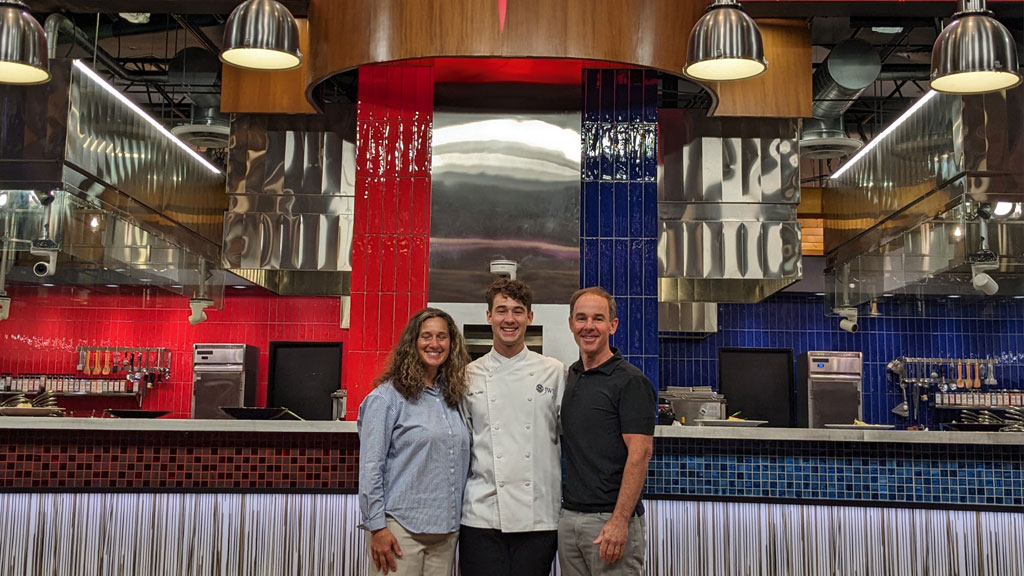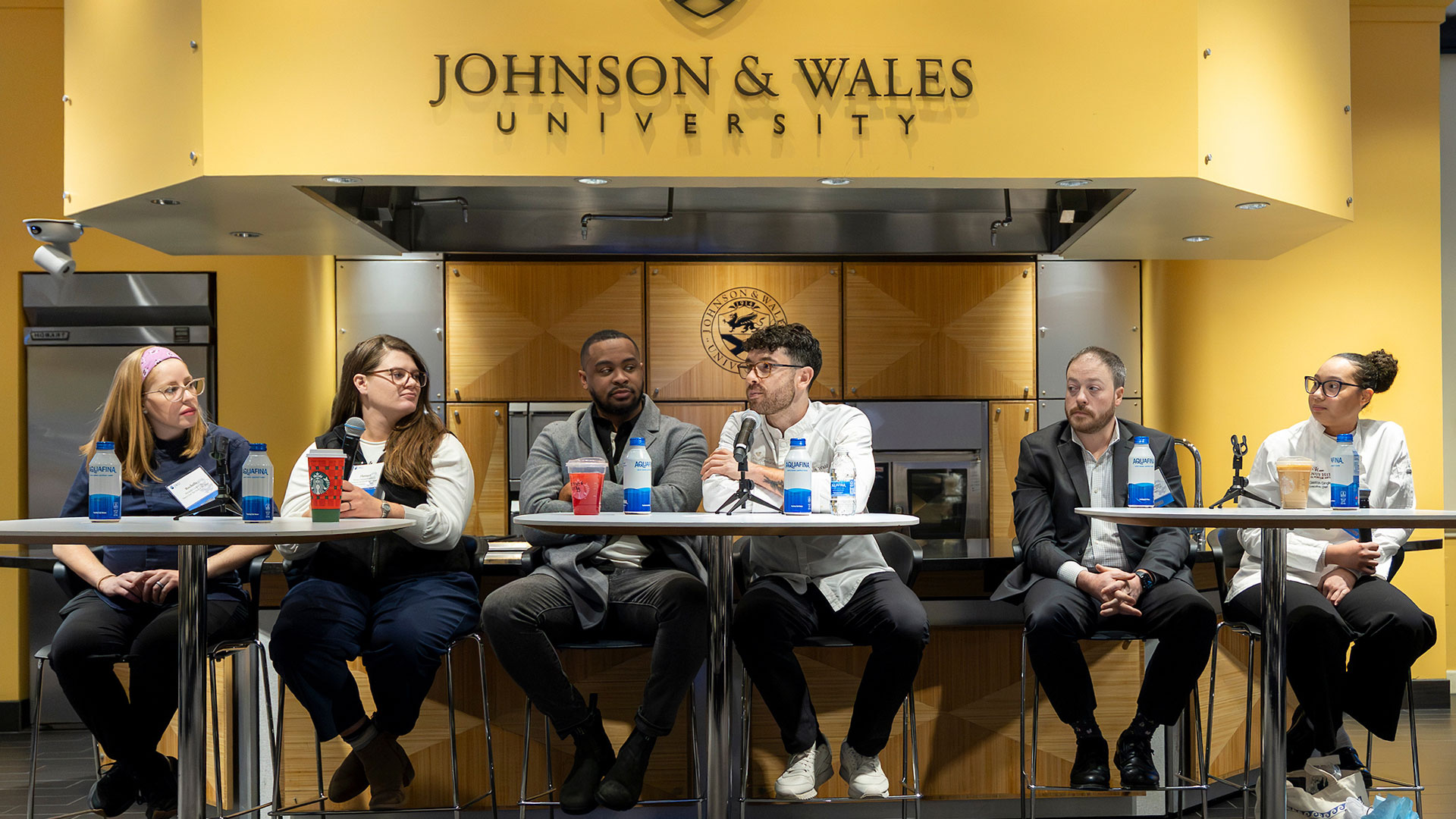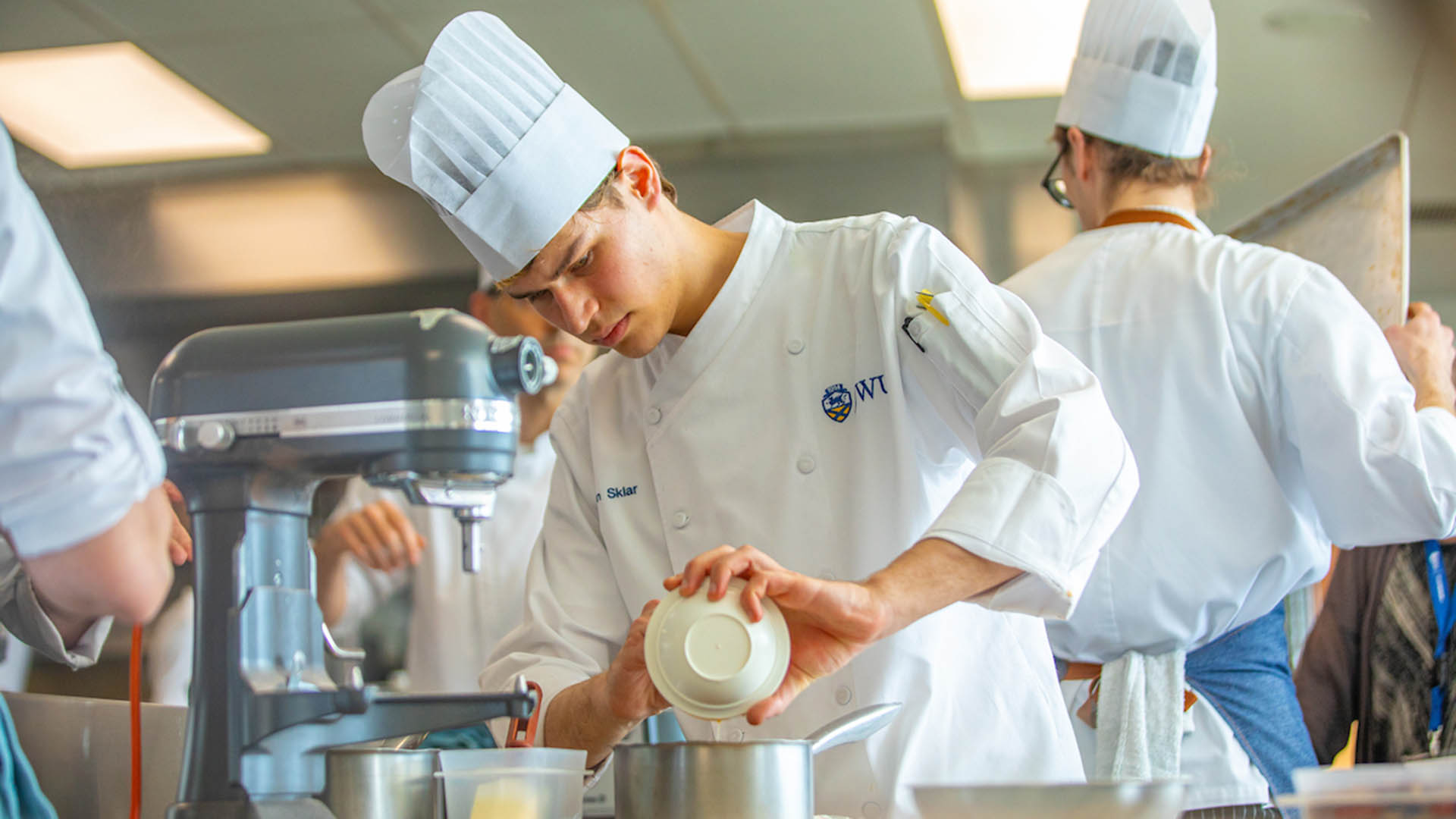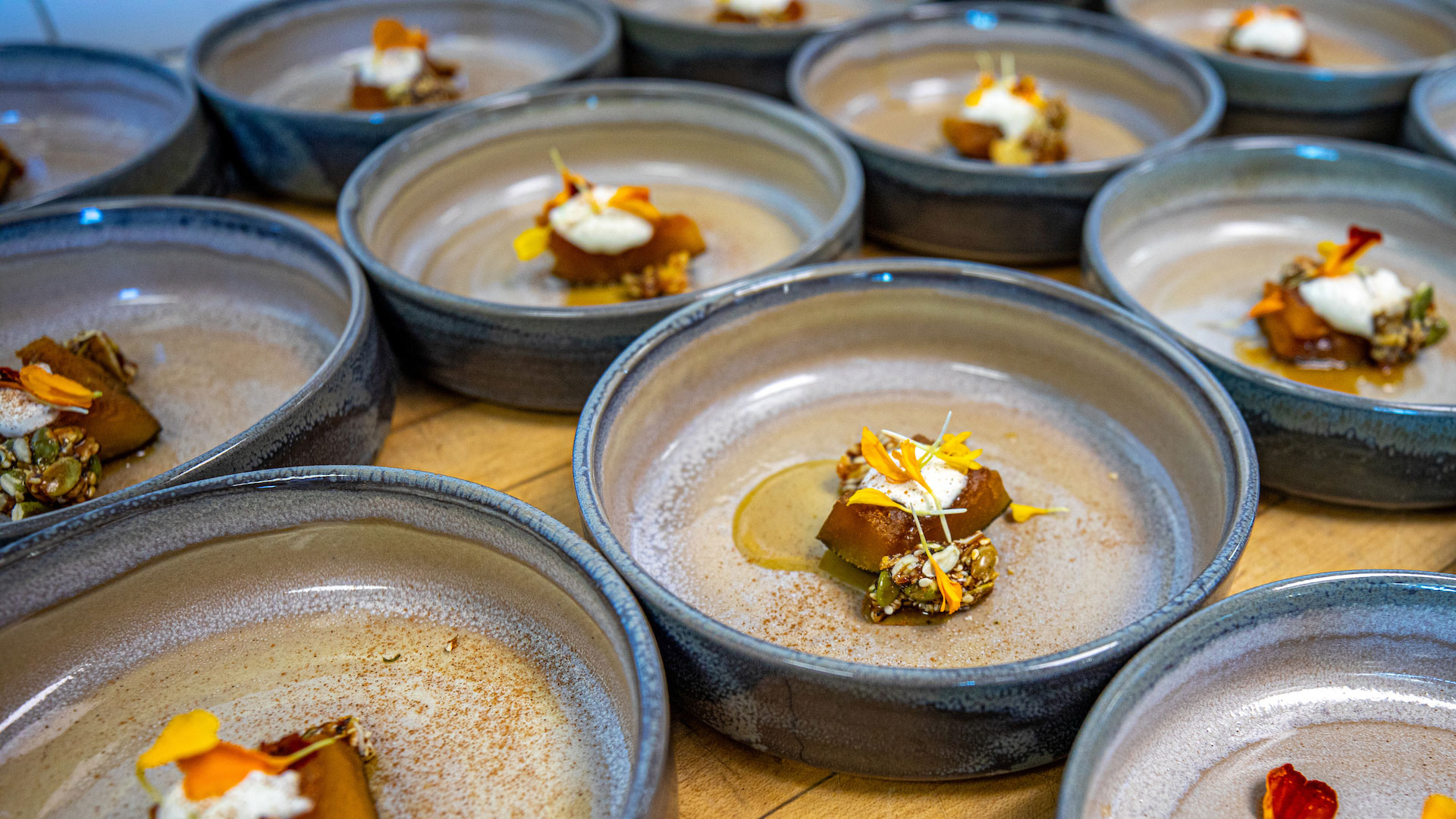Wildcats Bring the Heat: ‘Hell’s Kitchen’ Episode Showcases JWU
For Assistant Dean of Culinary Relations & Special Projects T.J. Delle Donne, M.A.T., CEC, JWU’s inclusion in an episode of “Hell’s Kitchen” Season 24 didn’t seem truly real until he was standing on the set and Gordon Ramsay, the show’s host, lined up the contestants to introduce the episode’s theme. Flashing photos of Emeril Lagasse ’78, ’90 Hon., Graham Elliott ’97, Michelle Bernstein ’94, ’03 Hon. and Rock Harper ’96, he asked them to guess what the chefs have in common. “Born in the same state?” “Same year?” “No, they all graduated from the prestigious culinary program at Johnson & Wales.” And boom! The set suddenly lit up in the JWU colors, blue and gold, with university logos and branding everywhere. “I was blown away,” said Delle Donne. “I had chills.”
A producer for the competition show contacted JWU last year to pitch the university’s involvement. After a conversation with JWU leadership outlining recent milestones, the “Hell’s Kitchen” team decided to structure the episode around the College of Food Innovation & Technology’s fiftieth anniversary.
For Delle Donne, the fact that it came together so quickly was “serendipitous.” Filmed last spring, all participants were under strict NDAs and could not reveal any outcomes of the episode. Now that it has finally aired, let’s go behind the scenes of one of television’s longest running chef competitions.
“There were ten competitors, so we had five against five with five different proteins.”
JWU Goes to Hell’s Kitchen
A show as complex as “Hell’s Kitchen” has multiple production teams, and they are often working on different aspects of multiple seasons at a time. In parallel to the opening of the “Hell’s Kitchen” restaurant at Foxwoods Casino, the production team custom-built a full studio set (complete with a working kitchen and dorms for contestants) in an underutilized part of the casino; this is where Seasons 23 and 24 of the show were filmed back-to-back. Since the Connecticut location was close to JWU, the production team invited the university to participate.
Centering the episode around a big Wildcat celebration also gelled quickly, said Delle Donne: “They asked if we were celebrating anything significant and at that time [last year] we had just celebrated our 50th anniversary. They said, ‘Here’s the idea: We’re going to throw you guys a birthday party. And the dinner service that you see on [the episode] will be an homage to your fiftieth, including centerpieces and decor that represents your school branding.’”
Delle Donne was responsible for setting up the morning challenge, which focused on underutilized fish species and classic French techniques, which are a good test of foundational skills under pressure. “There were ten competitors, so we had five against five with five different proteins. We had calamari because of Rhode Island; monkfish; scallop. And Gordon wanted duck and filet mignon, so I had to present those proteins.”
Surf-and-turf using classic Escoffier methods: So far, so challenging. With only forty-five minutes to make their dishes, start to finish — there was absolutely “no faking it,” said Delle Donne. Delle Donne and his assistant, Culinary Arts senior Hollis Tuffile ’26, were able to sit back and observe while the contestants cooked and the clock ticked down. Ramsay came out to taste and encourage their work, then came back when it was time for a 15-minute warning.
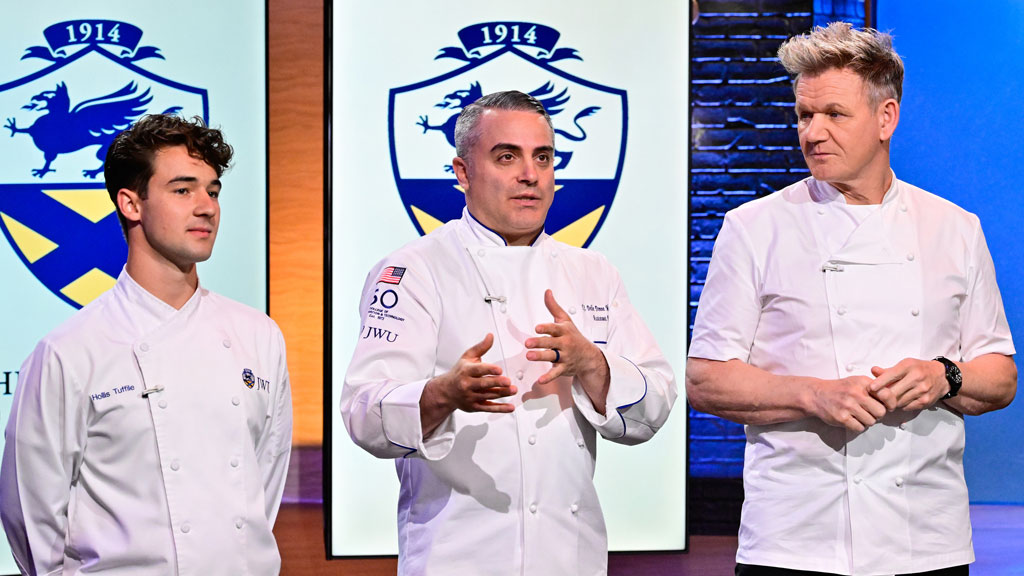
The Fine Art of Judging on Camera
Early on, it was decided that Delle Donne, Instructor Kelly Fernandes and Tuffile would serve as the judging team — three judges meant there would always be a tie-breaker.
But when a last-minute illness took Fernandes out of the running, the producers asked Delle Donne to take on the judging role himself, with Tuffile offering supportive running commentary. “It was a lot of pressure,” Delle Donne explained. “When you get to the top 10, we’re at the midway point. They all can cook. But you don’t have a lot of time; you don’t want to waste their time. You don’t want to waste Gordon’s time. There’s a camera in your face and you need an answer like that [snaps fingers]. You have to make that decision quickly.”
In general, Delle Donne was impressed with the creativity on display and the detail-oriented cooking. “They know what they’re doing,” he said. He fine-tuned his comments to get to the point quickly. “You say, ‘I like this. It has great flavor,’ ‘the monkfish is overcooked,’ or ‘I think you could have done a better job at that.’ And then Gordon says, ‘Blue or red?’ And obviously it’s best of five at that point.”
The experience reminded Delle Donne of being in class: “I went into teaching mode. They kept asking me, ‘Have you done this before? You’re like One-Take T.J.; they didn’t have to stop and reshoot anything.’ I felt like I was in class telling students.”
🔊Listen to Delle Donne & Tuffile on the JWU Podcast:
‘It Was Out of This World’
Although Tuffile had experience with American Culinary Federation (ACF) culinary competitions, which often take place in cavernous conference halls, he’d never seen anything on the scale of the “Hell’s Kitchen” set before: “It was out of this world. I was absolutely amazed at how large the set was. One of the producers was leading us through all the different things that were going on, like [the contestants] getting lined up and getting their makeup. We were walking through the kitchen, then another area where it looked like they were doing editing on the spot.” “That was big boy production right there,” quipped Delle Donne.
Tuffile spent some time observing the contestants. “During production, we were backstage watching the TV and they have cameras on the different stations. So you can watch one person doing knife cuts and juliennes and I’m nitpicking their cuts.”
This past spring, Tuffile went through the process to get his ACF culinary certification. “Knife cuts is one of the things I have to do. And I’m over here critiquing them and I think, ‘It’s so easy.’ And then I get to my certification challenge and I realize, ‘This is a lot harder than I thought.’”
“I went into teaching mode. They kept asking me, ‘Have you done this before? You’re like One-Take T.J.’ I felt like I was in class telling students.”
Celebrating a JWU Birthday Party
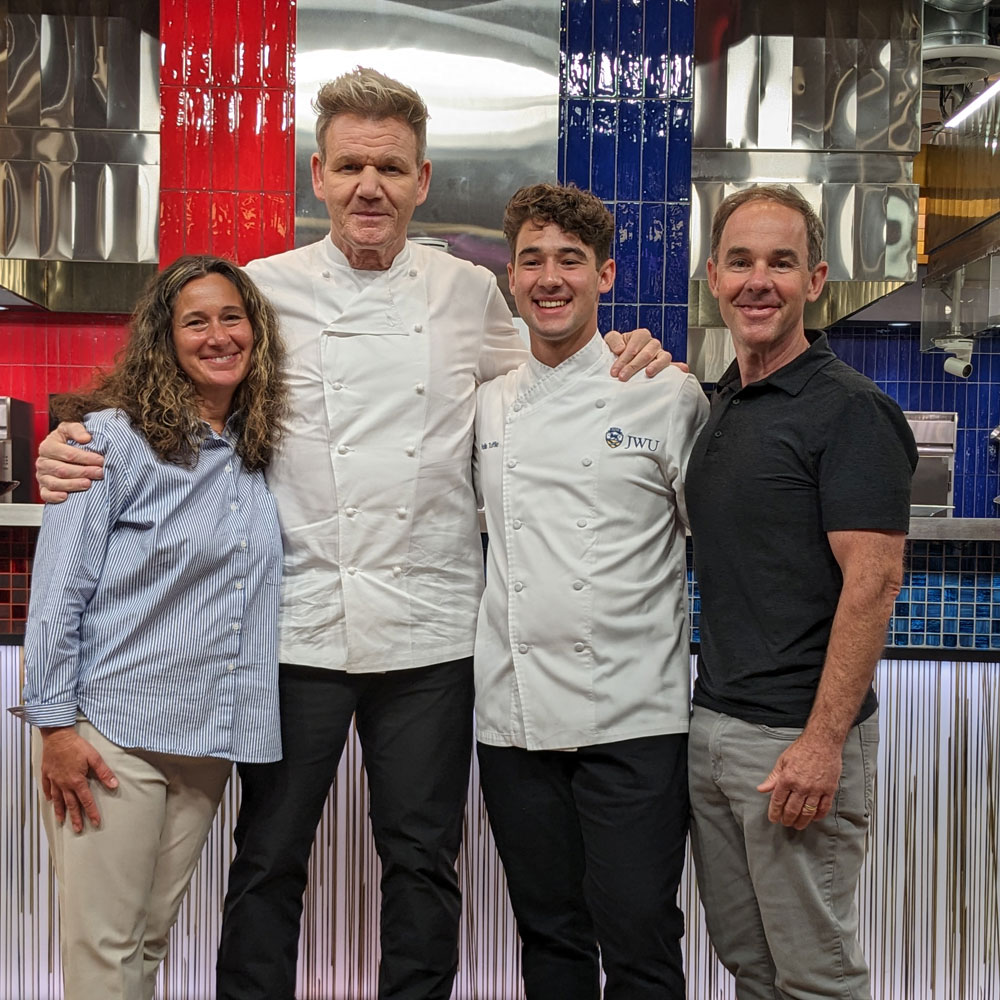 The morning team challenge helped determine the menu for the evening’s dinner service, a formal sit-down affair that included Delle Donne, Tuffile, Harper and a room full of JWU senior leadership, faculty, staff and invited guests.
The morning team challenge helped determine the menu for the evening’s dinner service, a formal sit-down affair that included Delle Donne, Tuffile, Harper and a room full of JWU senior leadership, faculty, staff and invited guests.
“Gordon addressed us before dinner even started: ‘I just want to welcome everybody here,’” noted Delle Donne. “Everything in the room was decorated blue and gold and white. All the school colors, all the centerpieces, and the birthday cake on display.”
For Tuffile, eating and trying to offer up criticisms of the meal was a challenge. “The cameras are on you and you’re trying to eat proper and everything, right,” he explained. “And they come around, asking, ‘Can you critique a little bit?’”
“It’s a total fishbowl,” said Delle Donne. “They’re asking you questions. ‘Okay. Tell me about the langoustine. Tell me about the monkfish.’ You’re giving them your feedback while you’re eating dinner.”
Feeling the Wildcat Spirit
For Delle Donne, the whole experience was tremendous, start to finish. For Tuffile, who was able to bring his parents and sister with him, “Participating as a guest judge on ‘Hell’s Kitchen’ while a JWU student was truly a once-in-a-lifetime opportunity. After filming the episode, talking one-on-one with Gordon Ramsay and receiving his advice was an incredible experience I never expected to have this soon.”
The feeling of pride and celebration was even greater for the two contestants with ties to JWU who took part in the episode.
“I wouldn’t be half the chef I am today without JWU and Wildcat Pride.”
For Season 24 competitor Chris Faison, who serves as the culinary director at New England Culinary Arts Training (NECAT) and who attended JWU in the early 2000s, being able to represent JWU “felt incredibly full circle,” he explained. “Standing there as a competitor, I couldn’t help but think back to my time in the classrooms and kitchens at JWU — the long hours, the lessons in professionalism and the constant push toward excellence. Those same values were what carried me through ‘Hell’s Kitchen.’ It was emotional to realize that the foundation I built at JWU is now what I teach and pass on to my own students. It felt like everything had come back around from being a student to becoming the kind of chef and mentor I once looked up to.”
For Anaiya Marie Lane ’20, being able to shine during the episode “felt like an honor — a chance to show the world everything JWU had taught me.” Lane, who currently serves as the sous chef at Bruce Auden’s Biga on the Banks in San Antonio, Texas, defines Wildcat Pride as “carrying the JWU spirit throughout everything I do, never forgetting all the opportunities offered to me throughout my time there that made me ME. I wouldn’t be half the chef I am today without JWU and Wildcat Pride.”
The JWU celebration at the heart of the episode reminded Faison that “the Wildcat community extends far beyond campus; it lives on in every kitchen, classroom, and moment where we push others to rise.” A good lesson for all of us to take to heart.
Faison and Lane made it into the Final 9 and will be in the hot seat again next week. Watch and cheer them on!
Explore Culinary Programs Apply Visit Transfer
Top: Assistant Dean T.J. Delle Donne with Hollis Tuffile '26 on set. Middle: FOX set photo with Tuffile, Delle Donne and Ramsay (courtesy of FOX/ITV). Inset right: Tuffile and his parents, Charles and Michelle, pose with host Gordon Ramsay. Below: Tuffile and his parents on the show set.
